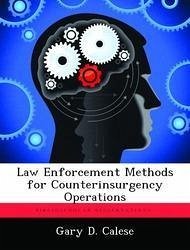Recent operations have forced the United States Army to re-examine the "art" of fighting insurgencies. Although these types of operations are not new to the Army, World War II and the subsequent Cold War diminished any skill or institutional knowledge the force had in these types of low intensity wars. In the post-Vietnam Army, insurgencies were almost exclusively the job of Special Operations Forces. The fall of the Soviet Union, a decade of Peacekeeping and the Global War on Terror have brought about a renewed focus on this type of un-conventional warfare. Although the language of "full spectrum operations" has been in doctrine for over ten years, combat in Afghanistan and Iraq have driven the Army to critically examine what may become the most prevalent form of warfare for the next 20 years. This monograph draws a correlation between insurgent organizations and organized criminal groups. Then, by extension, examines what the Army can learn from the law enforcement community. To limit the scope of this research, only criminal organizations in America were examined. Youth gangs and Mafia style organized crime are included in the study; however, international organized criminal groups are not. Only the law enforcement community in America is drawn on for potential tactics, techniques, or procedures that could benefit the Army in fighting insurgencies. This work starts with a doctrinal examination of counterinsurgency operations. It then compares the nature of insurgent organizations to criminal organizations. It does so by correlating five common characteristics: leadership within the organization, organizational structure, culture of the organization, recruitment, and finances. The parallel between insurgents and organized criminals established, the law enforcement community is studied for ways to assist the Army in counterinsurgencies. Today, there are sophisticated systems, structures, and tactics within law enforcement tailored to dismantle criminal organizatio
Hinweis: Dieser Artikel kann nur an eine deutsche Lieferadresse ausgeliefert werden.
Hinweis: Dieser Artikel kann nur an eine deutsche Lieferadresse ausgeliefert werden.








